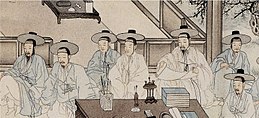JoongAng Ilbo
 | |
 Front page of JoongAng Ilbo (31 March 2015) | |
| Type | Daily Newspaper |
|---|---|
| Format | Berliner |
| Owner(s) |
|
| Founder(s) | Lee Byung-chul |
| Publisher | Jeongdo Hong |
| Founded | September 22, 1965 |
| Political alignment | Moderate conservatism[1] Centre-right[2][3] |
| Website | joins.com joongang.co.kr |
| Korean name | |
| Hangul | 중앙일보 |
|---|---|
| Hanja | 中央日報 |
| Revised Romanization | Jungangilbo |
| McCune–Reischauer | Chungang-ilbo |

 |
| Part of a series on the |
| Culture of Korea |
|---|
| History |
JoongAng Ilbo, known in English as Korea Central Daily,[4] is a South Korean daily newspaper published in Seoul, South Korea. It is one of the three biggest newspapers in South Korea. The paper also publishes an English edition, Korea JoongAng Daily, in alliance with the International New York Times.[5] It is also owner of broadcast station and drama producing company JTBC and movie theatres chain Megabox.
History[]
It was first published on September 22, 1965 by Lee Byung-chul, the founder of Samsung Group which once owned the Tongyang Broadcasting Company (TBC). In 1980, JoongAng Ilbo gave up TBC and TBC merged with KBS. JoongAng Ilbo is the pioneer in South Korea for the use of horizontal copy layout, topical sections, and specialist reporters with investigative reporting teams. Since April 15, 1995, JoongAng Ilbo has been laid out horizontally and also became a morning newspaper from then on. In 1999, JoongAng Ilbo was separated from Samsung.[6] As of March 18, 2007, it has produced a Sunday edition called JoongAng Sunday.
English and international issues[]
The Korea JoongAng Daily is the English language version of the newspaper, and it is one of three English-language daily newspapers in South Korea, along with The Korea Times and The Korea Herald. [7] It runs mainly news and feature stories by staff reporters, and some stories translated from the Korean language newspaper. The Korea JoongAng Daily is currently sold together with the International New York Times.
JoongAng Ilbo also publishes a United States edition, with branches from Toronto to Buenos Aires. Its parent company, Joongang Media Network (JMNet) holds publication rights to Korean editions of Newsweek and Forbes as well as 25% of the shares of JTBC cable TV.
Criticism[]
JoongAng Ilbo is considered by some critics as part of Chojoongdong (Korean: 조중동, CJD) a pejorative term which refers to the three highly circulated conservative newspapers in South Korea including JoongAng Ilbo. The word is an acronym of the Chosun, Joong-ang and Dong-a Ilbo newspapers, and the grouping is seen as forming the basis of South Korea's conservative media.[8] The term was used by Hankyoreh editor Jung Yeonju (Korean: 정연주) as early as October 2000.[9] Korean liberals criticize Chojoongdong primarily because of their conservative-biased editorial stances and doing business in a collusive and surreptitious manner. As of 2010, the market share of Chosun, Joong-ang and Dong-a Ilbo is 24.3%, 21.8%, and 18.3%, respectively.[10]
See also[]
- List of newspapers in South Korea
- Communications in South Korea
- List of Korea-related topics
- Joongang Tongyang Broadcasting Company
- Sohn Suk-hee
References[]
- ^ Dal Yong Jin, Nojin Kwak, ed. (2018). Communication, Digital Media, and Popular Culture in Korea: Contemporary Research and Future Prospects. Lexington Books. p. 125-126. ISBN 9781498562041.
Joongang Ilbo is considered a more moderate conservative daily and also publishes its English edition, Korea Joongang Daily, in an alliance with the International New York Times. These big three Korean newspapers have significant influences on ...
- ^ "Who's Right About the New US-South Korea Joint Military Exercise?". The Diplomat. March 8, 2019.
The editorial boards of the center-right JoongAng Ilbo and right-leaning Chosun Ilbo newspapers were in staunch opposition.
- ^ "North Korea and mounting tensions: The view from Seoul". Al Jazeera. April 14, 2017. Retrieved February 13, 2021.
“A pre-emptive strike could trigger a second Korean War,” wrote Kim Young-hie, a columnist for the right-of-centre JoongAng Ilbo newspaper, on Thursday.
- ^ Chung, Angie Y. (2007). Legacies of Struggle: Conflict and Cooperation in Korean American Politics. Stanford University Press. p. 318. ISBN 978-0-8047-5658-7.
- ^ "Archived copy". Archived from the original on October 15, 2013. Retrieved October 15, 2013.CS1 maint: archived copy as title (link)
- ^ Kim, Chunhyo (February 26, 2016). Samsung, Media Empire and Family. doi:10.4324/9781315669045. ISBN 9781315669045.
- ^ "Idaho Sen. Risch warns of war of 'biblical proportions' with North Korea". The Spokesman-Review. February 21, 2018.
- ^ Ricento, Thomas, ed. (February 2, 2015). Language Policy and Political Economy: English in a Global Context (2015 ed.). Oxford University Press. p. 175. ISBN 978-0-19-936339-1. Retrieved February 6, 2018.
- ^ Kim Sang-chul(김상철) (December 10, 2003). 조중동서 중앙 분리 글쎄요. The Kyunghyang shinmun (in Korean). Retrieved April 11, 2012.
- ^ Noam, Eli M. (2016). Who Owns the World's Media?: Media Concentration and Ownership Around the World. Oxford University Press. p. 828. ISBN 978-0-19-998723-8. Retrieved February 6, 2018.
External links[]
- Official website (in Korean)
- Korea JoongAng Daily (English-language version of the newspaper)
- Joins.com (web portal of the JoongAng Media Network Group)
- Korean-language newspapers
- Publications established in 1965
- Former Samsung subsidiaries
- Newspaper companies of South Korea
- Newspapers published in South Korea
- Conservatism in South Korea
- Mass media in Seoul
- 1965 establishments in South Korea